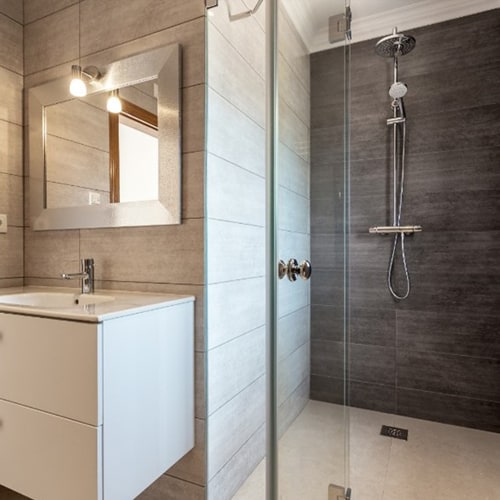Nano Coating VS Waterproofing, a common misconception of the difference kind of waterproofing and coating in the industry. We help breakdown these waterproofing terminology and coating method for your better understanding in the waterproofing world.
We drill down into 3 different component:
- Nano Coating
- Epoxy Coating
- Polyurethane Coating
Nano Coating
Nano coatings are a thin layer of polymeric chemical substances used to impart to a substrate surface. They are primarily used to change the hydrophobic and/or oleophobic properties of a surface by applying a protective coating to the substrate. Nano coatings are also known as nanotechnology coating. It is widely used on a variety of substrates such as metal, glass, ceramics, and polymers.
Nano coatings are designed to protect substrates by acting as a physical barrier to impact aesthetic qualities such as color, gloss, and texture.
Some benefits of Nano coatings are water repellent, reduced substrate maintenance to prevent corrosion, prolonged substrate lifespan, resistance to temperature fluctuations, and Ultraviolet (UV) stability and abrasion resistance. These coatings help to inhibit the growth of micro-organisms such as fungi and bacteria.
The most common application for Nano coating in Singapore is bathroom floors and walls with a nanotechnology waterproofing protection spray.
Nano coatings are not long-lasting. Some products may wear fast and need a continuous layer of coatings. Every substrate requires a different Nano coating, such as ceramic and glass coatings.
Such coatings are however not resistant to harsh chemical and microfiber cloths. They are also not suitable for old, contaminated substrates, the surface must be absolutely clean.
Epoxy Coating
Epoxy coatings are a coating compound consisting of two distinct elements, an epoxy resin, and a polyamine hardener/catalyst. They are mixed to provide a chemical reaction that creates an element as it cures to provide an ideal result of its durable, rigid plastic coating with numerous desirable mechanical properties. Epoxy coating is durable, abrasion, impact, and chemical resistant, an ideal protective coating for industrial settings.
Epoxy floor coating is commonly used to extend the lifespan of concrete in industrial facilities, warehouses, clinics, hospitals, and other locations that are subjected to vehicular traffic and heavy foot traffic. It is also commonly used in residential homes such as toilets and kitchen areas as waterproofing coating. It acts as a coating and filler at the same time, it is an easy application and resistant to various elements such as acid, rust, chemicals, corrosion, and heat.
Epoxy coatings disadvantage has a strong ammonia smell when wet, it typically required 3 hours to dry before the next coating application. The curing reaction slows rapidly at low temperatures. Epoxy coatings chalk when expose to intense sunlight. Therefore, the floor should be left to dry in warm conditions and the duration will depend on the temperature. Some installations can take even as long as 30 days to dry and cure completely. The fumes are toxic and may cause some side effects to anyone staying within the premises. Some common signs and symptoms are nose and eyes, throat, and lung irritation. However, it needs at least seven days to be fully cured before it can be ready for use. There will then be no health risks thereafter. Family members will have to evacuate their homes for a period of time to avoid health hazards, especially young children, the elderly, and asthmatic people.
As the coating wears away, constant reapplication will be required. Especially for places with high traffic and heavy impacts such as bathrooms, balconies, or even kitchens. Other public areas will be walk paths and corridors. Epoxy coatings can be very slippery especially when wet, resinous flooring material is non-porous although it creates a very smooth surface that becomes dangerous when wet or with oil on the surface.
Polyurethane Coating
Polyurethane coating is an excellent material for waterproofing. Polyurethane is polymer by nature, it does not melt when heated, polyurethane coating is visually similar to epoxy coating, however, they possess distinct characteristics that make specific applications for waterproofing industries. Polyurethane floor coatings are relatively softer and more elastic. This attribute makes polyurethane floor coating more suitable for heavy pedestrian traffic usage areas. The increased elasticity also makes polyurethane-coated floors more resistant to abrasion and less prone to scratches. These desired characteristics of polyurethane floor coating make them ideal for any application including car parks, and commercial facilities such as shopping malls, and hospitals. Based on the physical properties of polyurethane, it has zero water absorption.
The most significant advantage of polyurethane floor coatings is their curing time. Floors coated with this mater can be ready for operation the next day.
Polyurethane-based waterproofing membranes are a liquid-applied system that offers decisive advantages particularly seamless. Polyurethane coatings are a very popular choice due to their ease of installation. Unlike other waterproofing coating required more time, skill, and supervision. Polyurethane waterproofing membranes yield seamless membranes with long-term flexibility while sealing. It provides long-term durability and wear-resistant, UV and weather-resistant, alkaline cleaners, acidity, oil, and corrosion-resistant, strong adhesion, and aesthetic appearance.
The challenge is to find the best solution that delivers durable waterproofing protection. Several factors must be taken into consideration to determine which flooring coating product is most appropriate for the specific project. It is thus crucial to choose a product that is seamless and suitable for your needs.
Contact us, at SWC Construction to find our best solution to resolve your floor coatings application. Leave the task to us, we are certified waterproofing specialists and well trained in all waterproofing aspects.



